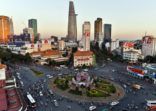The MRF scheme will allow cross-border selling of funds to retail investors in the mainland and in Hong Kong from 1 July.
Mok believes the scheme will have the same positive impact on Hong Kong markets as the Shanghai-Hong Kong Stock Connect.
“These are the programmes through which China wants to deflate the A-share market bubble,” Mok said in an interview with Fund Selector Asia.
“[They] are going to broaden investment channels for domestic investors.”
Retail investors in China have been the key driving force behind the mainland market rally. With the rise in valuations of A-shares, the retail liquidity from China has gradually started moving into Hong Kong-listed stocks.
Early stage of multi-year uptrend
The offshore market is at the early stage of a multi-year uptrend and looks attractive compared to the expensive A-share market, said Mok, who manages the Ireland-domiciled New Capital China Equity Fund.
“In terms of valuation, H-shares are far cheaper than A-shares. H-shares will see more upside and [will be] supported by inflows from overseas investors.”
Monetary easing measures and likely reforms in China’s state-owned enterprises also augur well for H-shares.
But because China’s market surge is retail investor-driven, expect short-term volatility.
“Retail investors are sitting on huge profit and will try to book profit whenever they hear bad news.
“On the other hand, we understand institutional investors are underweight China from the global emerging market perspective. So whenever the market pulls back a bit, this money could come in.”
State-owned enterprise reforms, which aim to encourage foreign ownership, are going to be a driving force for a re-rating of the market, he said.
HSBC Global and JP Morgan Asset Management recently echoed that point, saying that SOE reform will be a key investment theme.
Playing on industrials
The $480.5m New Capital China Equity fund has only about 3% exposure to the onshore China market (A-shares) and the rest of the portfolio is held in offshore China equities.
In terms of sector orientation, the fund has about a 35% allocation to the financial sector, followed by nearly 22% and 10% in industrial and healthcare companies, respectively.
Mok is overweight the industrial sector due to expectations for SOE reforms.
The financial sector has about 44% weighting in the MSCI China Index and therefore it is not surprising most funds will have higher allocation to the sector.
“Previously, most people were worried about the financial sector in China due to non-performing loans. But these concerns started receding when China started monetary policy easing. There is a big re-rating on the financial sector and some investors started accumulating stocks.”
Healthcare reforms
Mok has recently turned positive on the healthcare sector and built up exposure to pharmaceutical distributors.
“It is one sector where we see a very strong demand because of the aging population and [growing] wealth of the population and healthcare reforms.”
On 1 June, China lifted price controls on most medicines and said prices will be decided by the market.
“China changed the policies of how hospitals are going to make money. They have a zero margin on the selling of prescription drugs for the hospitals. This means they need to encourage hospitals to focus on charging fixed service charges rather than making money on selling drugs. That is a big change for most of the healthcare drug manufacturers and distributors.”
The beneficiaries of policies on perscription medicine he expects will be large distributors because they no longer have to share profits with hospitals.
Information technology has a lower allocation in the fund due to its expensive valuations, Mok added.
















